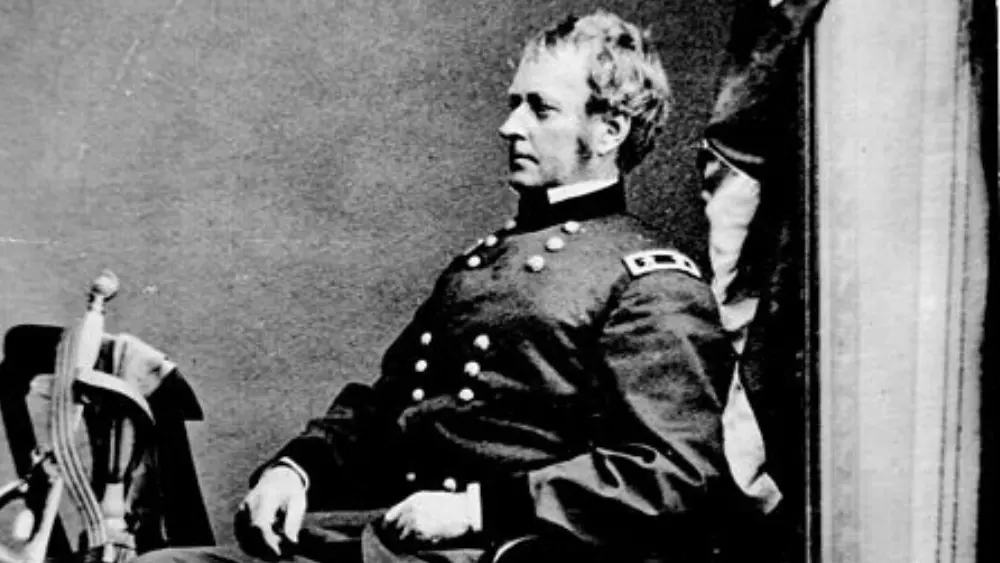Joseph Hooker, born on November 13, 1814, in Hadley, Massachusetts, rose to prominence as a Union general during the American Civil War. Known for his strategic brilliance and leadership on the battlefield, Hooker played a pivotal role in several key campaigns, leaving a lasting impact on the military history of the United States.
Early Military Career and Reputation
Joseph Hooker’s military journey commenced at the United States Military Academy at West Point, where he graduated in 1837. His early assignments and service in conflicts such as the Seminole and Mexican-American Wars played a crucial role in shaping his reputation for both competence and bravery. During these formative years, Hooker demonstrated leadership qualities and a strategic mindset that would later be tested on a grander scale during the American Civil War.
Hooker’s experiences in these early campaigns provided him with valuable insights into military strategy and the practicalities of leading troops in the field. His reputation as a capable and courageous officer laid the groundwork for his future role as a significant figure in the Civil War, where he would play a crucial role in various key engagements.
Joseph Hooker: Brigadier General in the Civil War: The Peninsula Campaign
Joseph Hooker’s prominence in the Civil War became evident when he was swiftly promoted to the rank of brigadier general. His strategic acumen and leadership abilities came to the forefront during the Peninsula Campaign, a major Union offensive aimed at capturing Richmond, the Confederate capital. Hooker’s contributions on the battlefield were noteworthy, showcasing his tactical skill and earning him recognition among his peers and superiors.
Throughout the Peninsula Campaign, Hooker’s performance demonstrated his ability to effectively lead troops in the complex and challenging terrain of the Virginia Peninsula. His achievements during this early stage of the war would set the stage for his continued ascent through the military ranks and his eventual command of the Army of the Potomac.
Known for in the U.S. Military: Command of the Army of the Potomac
Joseph Hooker’s appointment as the commander of the Army of the Potomac in January 1863 marked a pivotal moment in his military career. Faced with the task of revitalizing the demoralized Union forces, Hooker implemented significant reforms to improve the army’s efficiency and morale. He focused on addressing issues such as discipline, supplies, and overall organization, aiming to transform the Army of the Potomac into a more formidable and effective fighting force.
Under Hooker’s leadership, the Army of the Potomac underwent substantial changes. He introduced improvements in training, logistics, and medical care, all aimed at creating a more cohesive and capable military unit. Hooker’s efforts reflected his commitment to overcoming the challenges that had hampered Union successes in earlier campaigns, and he sought to position the Army of the Potomac for greater success in the ongoing conflict.
Joseph Hooker: Battle of Chancellorsville: A Tactical Setback
The Battle of Chancellorsville in May 1863 proved to be a challenging chapter in Joseph Hooker’s military career. Initially, Hooker’s strategy showed promise as he successfully executed a flanking maneuver that caught the Confederate forces off guard. However, despite early successes, the tide of the battle turned against the Union forces. Hooker’s hesitation and failure to exploit the advantages gained in the early stages of the campaign allowed Confederate General Robert E. Lee to orchestrate a counterattack that resulted in a Confederate victory.
The defeat at Chancellorsville had profound consequences for Hooker’s leadership, leading to his resignation from command of the Army of the Potomac. The strategic setbacks and the inability to secure a decisive victory weighed heavily on Hooker, and he stepped down from his position, marking the end of his tenure as the army’s commander.
Legacy of Tactical Innovations: The Corps System
Joseph Hooker’s legacy in the American Civil War extends beyond the challenges he faced on the battlefield. One of his enduring contributions was the introduction of the corps system, a revolutionary restructuring of the Union Army. Recognizing the need for increased flexibility and coordination, Hooker organized the army into smaller, more manageable units called corps. Each corps operated as a semi-independent entity, allowing for quicker decision-making and better adaptability on the battlefield. This innovative approach significantly enhanced the efficiency of the Union Army and provided a strategic framework that later Union generals, including Ulysses S. Grant, utilized to great effect in subsequent campaigns.
The corps system, despite Hooker’s resignation following the Battle of Chancellorsville, became a hallmark of Union military organization during the later stages of the war. It played a crucial role in shaping the Union’s military strategy and contributed to the ultimate success of the Northern forces. Hooker’s legacy, therefore, is not only marked by the challenges he faced but also by the lasting impact of his tactical innovations on the Union Army’s structure and effectiveness.

Joseph Hooker: Post-Civil War Career and Legacy
Following his departure from the military, Joseph Hooker’s post-Civil War career was characterized by a continued commitment to public service and an endeavor to rehabilitate his tarnished reputation. Despite the challenges and controversies of his leadership during the Civil War, Hooker remained active in military affairs. He served as a major general in the United States Army until his retirement in 1868. During this period, Hooker sought to contribute positively to the post-war military establishment while dealing with the aftermath of his resignation from command.
Hooker’s legacy, both during and after the Civil War, remains a subject of historical analysis and debate. While his reputation suffered due to setbacks such as the Battle of Chancellorsville, his introduction of the corps system and subsequent efforts in post-war military service contribute to a more nuanced assessment of his career. The complexities of Hooker’s legacy underscore the challenges faced by Civil War generals in an unruly era of American history, where military leadership often intersected with political and personal dynamics.











